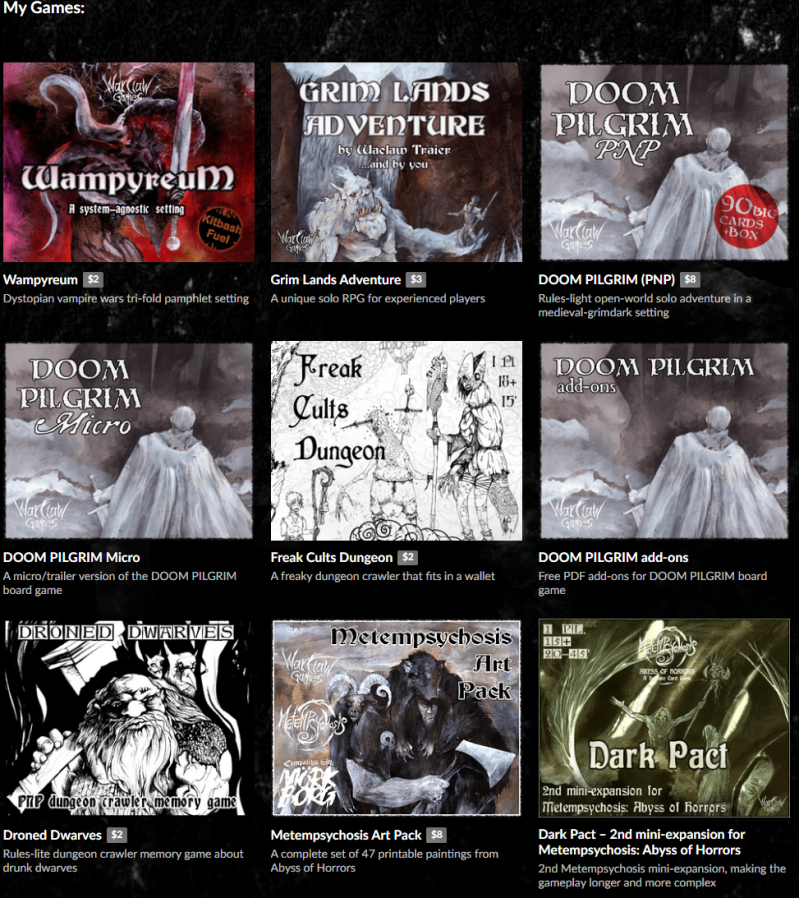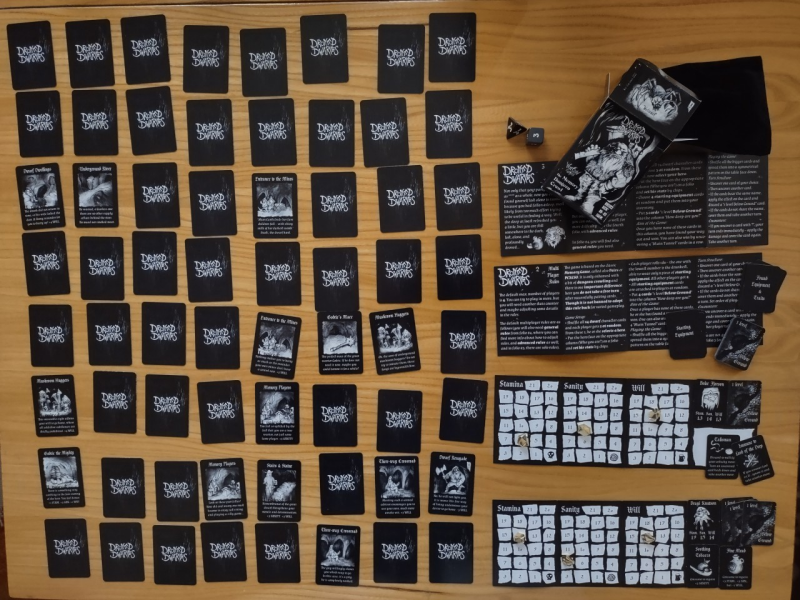
War Claw Games is a small yet distinctive independent label established in 2020 by an illustrator originally known for collaborations with heavy metal bands. Each game produced by War Claw Games is a complex and immersive experience, tightly focused on a unique and original theme. Notable titles from War Claw Games include Doom Pilgrim, Doom Deeper (recently released), Metempsychosis: Abyss of Horrors, and Droned Dwarves.
We had the privilege of speaking with W, the creative force behind War Claw Games, to dive into the mind of this innovative designer and explore the unique philosophy and creative process that drives their work.
Interview
Let’s start at the beginning, W. What was the defining moment that made you realize you wanted to design games?
"Since I got my very first gamebook as a kid—it was Citadel of Chaos from the Fighting Fantasy series—I was so fascinated by it that I tried to write my own gamebooks immediately. But I would never expect my creations to be a real thing for the public. Such a thing became possible for me some 30 years later thanks to the PNP portals and finally thanks to the Game Crafter."
How has your personal life influenced the games you create?
"It influenced them a lot, as I have almost no time thanks to personal life—family and stuff—so my games have to be really straightforward and minimalist, no time for special curls and fancy details, hehe. But more seriously, if me being kind of a scholar (philosophy and religious studies at Charles University) counts as personal life, then it is the biggest influence: for example, my game Metempsychosis: Abyss of Horrors has its background in one of the most pessimistic philosophical positions, and my Doom Pilgrim takes a lot from my familiarity with European medieval phenomena."


"I have the theory that the best ideas are so good that you cannot forget them."
Your games have a distinctive style and depth. Who or what are your biggest influences in game design?
"For sure Steve Jackson and Ian Livingstone. Also Richard Garfield, as I played Magic: The Gathering a lot."
What is the experience you want players to have when they dive into one of your games?
"Strong immersion. It is very important for me as I see playing as a kind of escapism from our normal world."
Balancing creativity and analytical thinking is essential in game design. How do you manage that balance?
"Well, I am sure I am bad at the balance. Creativity is everything for me, while maths are boring, hehe. That’s why I have so many unfinished projects—I flee very easily from a project when it reaches the stage where less amusing work is needed. Then I’d rather start a new project from scratch where I can play with creativity again."
In your opinion, what makes a game truly engaging for players?
"I think a game must offer some serious challenge and also the feeling that the decisions one makes matter."
Could you walk us through your typical game design process, from concept to final product?
"I am a visual artist first, so I usually start with painting all the stuff. Meanwhile, game mechanics ideas come to me in the form of tons of ideas from which I must choose and combine those that work best together. I make a lot of notes, but in the end, my experience shows that there are so many notes that I never get back to them. I write the rules and stuff just from my memory about the core that crystallized from all of it in my mind—I have the theory that the best ideas are so good that you cannot forget them. Those which you forgot, weren’t that good, haha. (I know it’s not true, and if I could get back to my notes, a better game might be made, but I am not capable of it—my workflow would freeze if I left the stream of creative enthusiasm for more serious work.)"
Playtesting is a critical part of game development. How do you handle playtesting, and what role does feedback play in your design process?
"This is the most crucial stage for me. I usually abandon projects in this stage because I don’t have time to playtest them on my own (which is needed before you can send them for blind playtesting to other people). And then, if I manage to get through the first phase, I do not like the last phase—incorporating feedback from people and changes into finished designs. These are the stages that need hard sober work, not free creativity, and so they are not my favorite, though they are really important for any finished product. If I do them, I take them very seriously."
How do you know when a game is truly finished?
"When all my pictures have their texts and icons on them and when there is no blank space on the box, it is finished, haha. I know a lot of people tend to polish and polish and polish, but this way you won’t get a finished product anyway, because each creation can always be better in this or that way, and you will never achieve perfection. So, don’t stress it too much—if you like it and players love it, it is finished, hehe."

"once I finally made that step, I saw how user-friendly the Game Crafter interface is. You don’t need special skills, you just upload your JPGs and that’s it. Awesome!"
What has been the most challenging aspect of your career as a game designer?
"Definitely starting to use the Game Crafter. As I am a very nervous guy with weak psyche, every step into a new area is super hard for me. I expected the Game Crafter to be very complicated because I got a bit familiar with another print-on-demand portal, which indeed was complicated for me. But once I finally made that step, I saw how user-friendly the Game Crafter interface is. You don’t need special skills, you just upload your JPGs and that’s it. Awesome!"
Can you share a particularly memorable moment or achievement in your game design journey?
"I don’t know if that counts as a game design achievement, but I cherish the moment when The Dungeon Dive channel accoladed my Doom Pilgrim as the best small game of the year. I would never have expected that, and I am deeply grateful for it."
Creative blocks and self-doubt are common among creators. How do you overcome these challenges?
"I start a new project, and sooner or later, the period ends, and I can return to the first one. But more often, I don’t have the enthusiasm for the preceding project anymore and can’t return to it. That’s why I have tons of unfinished projects, even in quite progressed stages—so maybe I should rather say I don’t know how to overcome such blocks, hehe."
Where do you find inspiration for your game designs?
"When I had time, as a student and before having a family, I read a lot, watched a lot of films and stuff, so I think my mind is full of things that now boil and spit out ideas on their own. I don’t think I draw new inspiration nowadays, though maybe … yeah, Dark Souls, Elden Ring, and stuff… these things do inspire me still, even though I don’t play them, just watch some boss fights on YouTube here and there."



"do what pleases you the most, as it will be seen from the product whether it came straight from your heart."
Accessibility is a hot topic in game design. Do you worry about ensuring that your games are accessible and enjoyable for a wide audience?
"I don’t ensure that. My games are not for a wide audience, haha. On one of the biggest PNP portals, they rejected my Metempsychosis for being too intense back then, and I rather put an 18+ stamp on Doom Pilgrim as there are things like flaying, poking out your own eye to have a witch make an elixir for you, and stuff. And my other games are controversial in this or that way as well, so I can’t aim for a wide audience. Even more so, I am grateful for any real fan of my weird stuff."
Finally, what advice would you give to someone just starting out in game design?
"Don’t expect sales if you have not invested a huge effort into promotion. But it does not sound like a very optimistic end to an interview, huh? So, let’s rather say: do what pleases you the most, as it will be seen from the product whether it came straight from your heart."
W’s candid insights offer a rare glimpse into the world of independent game design, where creativity and passion drive the process more than anything else. War Claw Games continues to carve out a niche with its deeply immersive and challenging games, appealing to a dedicated community of players who appreciate the raw, unfiltered vision behind each title.



Add comment
Comments